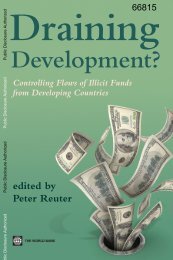International Trade in Services.pdf - DSpace at Khazar University
International Trade in Services.pdf - DSpace at Khazar University
International Trade in Services.pdf - DSpace at Khazar University
Create successful ePaper yourself
Turn your PDF publications into a flip-book with our unique Google optimized e-Paper software.
78 <strong>Intern<strong>at</strong>ional</strong> <strong>Trade</strong> <strong>in</strong> <strong>Services</strong><br />
Box 3.4: Us<strong>in</strong>g Foreign Legal Consultants to Facilit<strong>at</strong>e <strong>Trade</strong><br />
The c<strong>at</strong>egory of foreign legal consultants represents a common means of allow<strong>in</strong>g<br />
foreign lawyers to oper<strong>at</strong>e <strong>in</strong> a market as advisers on a restricted basis. Frequently,<br />
these consultants are prohibited from practic<strong>in</strong>g host country law, but may practice<br />
home country, third-country, or <strong>in</strong>tern<strong>at</strong>ional law with the appropri<strong>at</strong>e qualific<strong>at</strong>ions<br />
and licensure (WTO 1998). Foreign legal consultants may also work on provid<strong>in</strong>g<br />
legal document<strong>at</strong>ion and certific<strong>at</strong>ion services and other advisory and <strong>in</strong>form<strong>at</strong>ion<br />
services.<br />
Jordan, Oman, and Saudi Arabia offer examples. Jordan allows foreign<br />
practitioners to advise on third-country law even though only Jordanian n<strong>at</strong>ionals can<br />
represent clients <strong>in</strong> Jordanian courts (WTO 2000a). Similarly, Saudi Arabia allows<br />
foreign practitioners to advise on third-country law and <strong>in</strong>tern<strong>at</strong>ional law, but<br />
reserves host country law to n<strong>at</strong>ionals. Only Saudi n<strong>at</strong>ionals may appear <strong>in</strong> court to<br />
plead cases (WTO 2005). Oman allows foreign practitioners to advise only on home<br />
country law, third-country law, and <strong>in</strong>tern<strong>at</strong>ional law (WTO 2000b). Represent<strong>at</strong>ion is<br />
reserved to Omani n<strong>at</strong>ionals. Thus, foreign law professionals <strong>in</strong>terested <strong>in</strong> work<strong>in</strong>g <strong>in</strong><br />
Jordan, Oman, or Saudi Arabia would be allowed to provide advisory services <strong>in</strong> select<br />
areas. However, they would not be allowed to appear <strong>in</strong> court <strong>in</strong> any of the countries.<br />
In addition, they would have to adhere to each country’s licens<strong>in</strong>g requirements and<br />
n<strong>at</strong>ional rules.<br />
Countries may use the c<strong>at</strong>egory of foreign legal consultant to facilit<strong>at</strong>e the<br />
practice of home country, third-country, and <strong>in</strong>tern<strong>at</strong>ional law. Practitioners who are<br />
<strong>in</strong> good stand<strong>in</strong>g, have adequ<strong>at</strong>e qualific<strong>at</strong>ions, and are expert <strong>in</strong> home country,<br />
third-country, or <strong>in</strong>tern<strong>at</strong>ional law are frequently allowed to practice under this<br />
limited design<strong>at</strong>ion. For example, Morocco permits the activity of foreign legal<br />
consultants, while limit<strong>in</strong>g represent<strong>at</strong>ion <strong>in</strong> court and specialized legal services to<br />
n<strong>at</strong>ionals (World Bank 2007). In Tunisia, <strong>in</strong> contrast, while the use of the foreign legal<br />
consultant title is toler<strong>at</strong>ed, the absence of a legal framework exposes established<br />
foreign law firms to uncerta<strong>in</strong>ty.<br />
practices provide educ<strong>at</strong>ion to members, assist <strong>in</strong> the management of law<br />
practices, and facilit<strong>at</strong>e crossborder referrals (ABA 2002).<br />
Legal Process Outsourc<strong>in</strong>g Offers New Export<br />
Opportunities<br />
Establish<strong>in</strong>g an onl<strong>in</strong>e presence and partner<strong>in</strong>g with other law firms can be effective<br />
ways of reach<strong>in</strong>g foreign clients. However, the Internet is help<strong>in</strong>g law firms to<br />
partner, market, and deliver their services, and it has become a prom<strong>in</strong>ent tool<br />
among clients seek<strong>in</strong>g to procure legal services. Onl<strong>in</strong>e case m<strong>at</strong>ch<strong>in</strong>g is be<strong>in</strong>g<br />
used, for example, to post legal needs and request bid proposals from law firms.<br />
Moreover, bus<strong>in</strong>ess process <strong>in</strong>nov<strong>at</strong>ion enables the unbundl<strong>in</strong>g of legal services<br />
and the consequent outsourc<strong>in</strong>g and offshor<strong>in</strong>g of discrete legal service activities.<br />
Law firms are <strong>in</strong>creas<strong>in</strong>gly specializ<strong>in</strong>g and offer<strong>in</strong>g dist<strong>in</strong>ct products such as

















